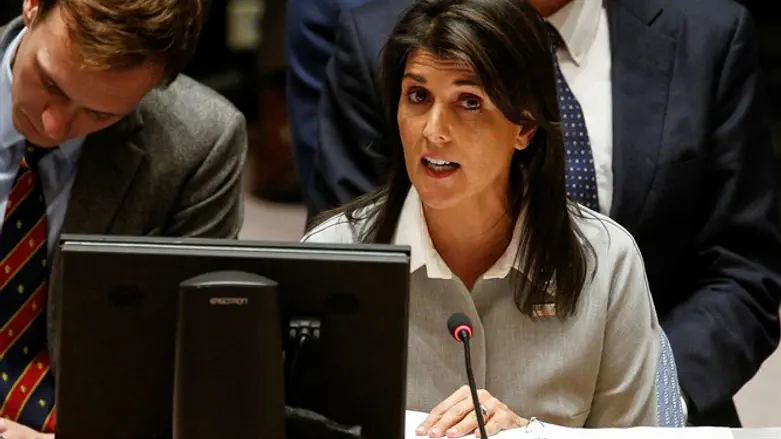
U.S. ambassador to the United Nations Nikki Haley on Thursday presented what she called "undeniable" evidence that a ballistic missile fired by Houthi rebels in Yemen at Saudi Arabia last month was Iranian-made.
The United States’ UN mission had announced on Wednesday that Haley would present "irrefutable evidence" that Iran has tried to cover up violations of international obligations.
In her remarks on Thursday, Haley accused Tehran of a "blatant violation" of UN Security Council obligations designed to rein in its missile activity.
Standing in a warehouse at a Washington military base in front of recovered pieces of two missiles, Haley said Iranian fingerprints were all over the weapons, one of which she said was fired at Riyadh's airport on November 4.
"It was made in Iran then sent to Houthi militants in Yemen," Haley said, according to the AFP news agency.
"From there it was fired at a civilian airport with the potential to kill hundreds of innocent civilians in Saudi Arabia," she added.
Haley charged that the 2015 nuclear deal to curb Iran's nuclear program had "done nothing to moderate the regime's conduct in other areas," and accused Tehran of "fanning the flames" of regional conflict.
The United States and Saudi Arabia have accused Iran of supplying weapons to Yemen's Houthi rebels.
Haley has called on the UN Security Council to take a tougher stance toward Iran, accusing Tehran of making illegal arms deals in Yemen, Lebanon and Syria.
In response to her remarks on Thursday, Iranian Foreign Minister Mohammad Javad Zarif posted on Twitter a photo of Haley juxtaposed with a well-known image of former Secretary of State Colin Powell appearing before the Security Council, where he provided intelligence in the run-up to the 2003 Iraq war that was later found to be false.
"When I was based at the UN, I saw this show and what it begat...," Zarif wrote.
The Iranian mission said the accusations leveled by Haley were intended to divert attention from the devastating war in Yemen being led by Saudi Arabia, a key US ally.
A confidential report to the council says UN officials had examined debris from missiles fired at Saudi Arabia which pointed to a "common origin" but there was no firm conclusion as to whether they came from an Iranian supplier.
Haley said the missiles were Iranian Qiam-class short-range ballistic rockets and pointed to valves that she said proved their origin. The Qiam-1 is based on a modified Scud design.
She showed other pieces of military material she said were provided by Iran, and after her announcement officials showed journalists pieces of an anti-tank missile, an explosive boat, drones and other gear.
"The evidence is undeniable. The weapons might as well have had 'Made in Iran' stickers all over it," said Haley, according to AFP.
Asked about Haley's claims that the evidence that Iran had supplied the missile was irrefutable, Sweden's UN Ambassador Olof Skoog said "she may be in possession of evidence that I have not seen. The information that I have up to now is less clear."
Haley did not discuss the timeline of when Iran is supposed to have provided the weapons, or whether this may have happened before the nuclear deal was signed.
The Saudi embassy in Washington welcomed Haley's remarks and "U.S. condemnation of Iran's hostile activities that support and arm terrorist groups, including Hezbollah and Houthi terrorist militias."
In addition to its nuclear aspirations, Iran's ballistic missile program remains a concern as well. The Islamic Republic has several times test-fired ballistic missiles in recent months, raising the ire of the West.
The United States has already imposed sanctions on Iran, saying its missile tests violate UN resolutions. Iranian President Hassan Rouhani has stressed that Iran will continue to produce missiles for its defense and does not consider that a violation of international agreements.